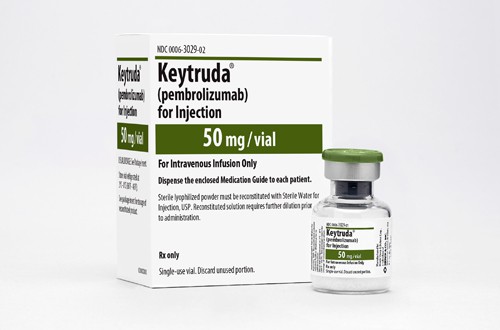
Merck & Co has now suspended three clinical trials of its checkpoint inhibitor Keytruda in the blood cancer multiple myeloma at the request of the FDA.
Merck had previously called a halt to patient recruitment in two combination studies of Keytruda (pembrolizumab) in multiple myeloma – KEYNOTE-183 and KEYNOTE-185 – and the FDA has now placed both of those under a formal clinical hold, along with another trial called KEYNOTE-023.
More patients taking Merck’s drug died than those getting other treatment in the three trials, which all involved combinations of Keytruda with Celgene’s Pomalyst (pomalidomide) and Revlimid (lenalidomide), two blockbuster drugs that are widely-used in myeloma treatment. The intention is to combine two types of treatments that have immune effects, trying to enhance the capacity of the immune system to control tumour cells.
The concern is that some form of interaction is putting patients at risk and could dramatically impede the potential of Keytruda in this patient group and other related haematological cancers, as Revlimid is also used to treated myelodysplastic syndromes and mantle cell lymphoma.
KEYNOTE-183 is testing Pomalyst and low-dose dexamethasone with or without Keytruda in relapsed myeloma patients, while KEYNOTE-185 has a similar design but involves Revlimid plus low-dose dexamethasone with or without Keytruda in newly diagnosed patients. All patients receiving Keytruda will stop treatment, according to Merck.
KEYNOTE-023 is a phase I study looking at Keytruda in combination with standard care – Revlimid, dexamethasone or Amgen’s Kyprolis (carfilzomib) – in heavily pre-treated myeloma patients. Only patients taking the Keytruda/Revlimid/dexamethasone combination (Cohort 1) will discontinue treatment.
Preliminary results from the KEYNOTE-023 study were reported at the American Society of Clinical Oncology (ASCO) meeting last year, revealing high response rates for the combination.
“Patient safety is Merck’s primary concern, and we are grateful to the study investigators and patients involved in these studies for their commitment to this important research,” said Merck’s R&D chief Roger Perlmutter.
The company stressed that other Keytruda trials are not affected by the decision and that aside from its approvals in six cancers including skin, lung and bladder cancer, Keytruda is currently being tested in around 30 different tumour types. Nevertheless, the clinical hold is a setback for the company as it tries to close the gap in the market with leading PD-1 inhibitor Opdivo (nivolumab) from Bristol-Myers Squibb.
Merck shares fell around 1% in after-hours trading in the wake of the announcement.




